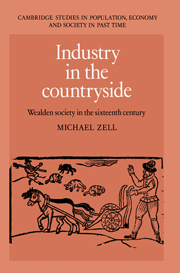Book contents
- Frontmatter
- Contents
- List of figures
- List of tables
- Acknowledgements
- List of abbreviation
- 1 Introduction
- 2 Landholding, inheritance and the local land market
- 3 Demographic movements, household structure and geographical mobility
- 4 The Wealden agrarian regime
- 5 Occupational structure and levels of wealth in the Weald
- 6 The textile industry in the Weald
- 7 Clothiers and capitalism
- 8 The Weald and ‘proto-industrialization’
- Bibliography
- Index
- Cambridge Studies in Population, Economy and Society in Past Time
8 - The Weald and ‘proto-industrialization’
Published online by Cambridge University Press: 13 October 2009
- Frontmatter
- Contents
- List of figures
- List of tables
- Acknowledgements
- List of abbreviation
- 1 Introduction
- 2 Landholding, inheritance and the local land market
- 3 Demographic movements, household structure and geographical mobility
- 4 The Wealden agrarian regime
- 5 Occupational structure and levels of wealth in the Weald
- 6 The textile industry in the Weald
- 7 Clothiers and capitalism
- 8 The Weald and ‘proto-industrialization’
- Bibliography
- Index
- Cambridge Studies in Population, Economy and Society in Past Time
Summary
The proto-industrialization model advanced by Mendels, Wrightson and Levine, and others relied – for its empirical foundations – on seventeenth- and eighteenth-century examples. In France, to cite one important instance, the migration of textile production from towns to the countryside began in the sixteenth and seventeenth centuries, several hundred years later than the same transformation occurred in England. From about 1600 a wide variety of economic and demographic evidence survives with which to study the evolution of rural industry – and to test the model. In particular, after 1600 – both for England and for many regions of Continental Europe – there are data available to examine the links between rural industry and demographic change. But the proto-industry under the spotlight here traces its origins back to the fourteenth century. English rural clothmaking was established in all the major regions it was ever to thrive in before 1500: the West Country, East Anglia, West Yorkshire and the Kent Weald. Woollen manufacture was flourishing in all these areas for half a dozen generations before the parish register era began in 1538. Little evidence is available to study the origins and early growth of the characteristic English proto-industry – woollen textiles. The applicability of the model to sixteenth-century England has to be assessed on evidence drawn from an era when rural cloth production was already commercially successful, rather than from throughout its development.
- Type
- Chapter
- Information
- Industry in the CountrysideWealden Society in the Sixteenth Century, pp. 228 - 246Publisher: Cambridge University PressPrint publication year: 1994



